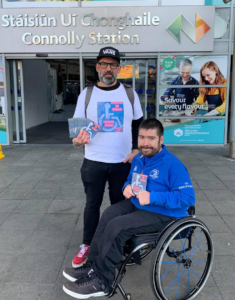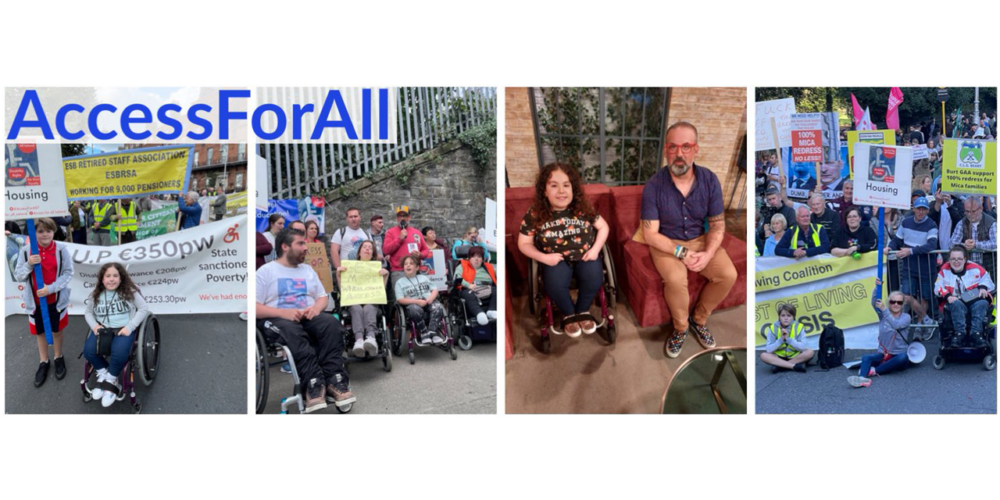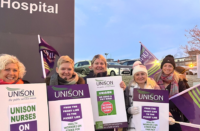Access for All Ireland is an advocacy group that highlights the difficulties faced by anyone in Ireland with mobility issues. I sat with Brendan Mulvaney, co-founder of the group, to discuss what the organisation’s goals are, how Ireland ranks internationally, and how politics intersects with the issue of accessibility.
A: My interest in interviewing you was based on my mother’s experience with reduced mobility and her need to use a mobility scooter. Once she started using it my eyes were really opened to how difficult and inaccessible this country is. Even a short journey from her house to the main street was littered with obstacles: kerbs, difficult laneways, and so on.

“The thing is, disability doesn’t discriminate. It affects everyone, regardless of colour or creed. If a person of colour was told they had to wait 24 hours to take a train, the country would erupt. And rightly so! But for a person of disability it’s accepted. And this is the reason why we’ve become such close comrades with members of the Travelling community. We’re not allowed to go to places because it’s too expensive to make it accessible, but they’re not allowed because of inherent racism in Irish society. They’ll apologise to us with embarrassed faces, whereas with Travellers it’s just outright rejection. And the amazing thing with the Traveller activists that we’ve become close to is that they look at us not with envy but with sympathy. And they see the barriers that people in wheelchairs face and think, ‘We face those barriers too—but they’re all man-made.’
“If you build society from the ground up, inclusive for everyone, then it’s cream all the way to the top. But the capitalist mentality is ‘That costs too much money.’ And it’s acceptable discrimination. We’ve had to work very hard to get that into our socialist politics. Socialist politics is about workers primarily, but there’s some work coming out that’s starting to emphasise this aspect. There’s an economy around people with disabilities that they contribute to, and it could be an addition to the public economy.
“In 2008, when they switched to home help and moved to the private model, now workers are on zero-hour contracts, with no benefits, on low wages. We should be supporting this industry through the state and not privatising.”
A: It sounds like you see your struggle within a general inaccessibility of life, in terms of urban design constricted by free-market paradigms.
“I see a great movement among people—typical to a union, when workers come together to organise. There’s the same opportunity for us to come together for a greater vision of society. When I talk about inclusion it’s very broad—not necessarily just about getting a train. When myself and Seán [other co-founder] first got together we had this discussion. We knew to get across our message we had to think of an issue that affects everyone. The thing for us was the lifts in DART stations in Dublin. Thirty-two stations; they should all be fully accessible, and at any given time half could be out of service. Obviously, things can break down, but they need to be fixed, and fixed quickly. And it isn’t just people with disabilities: commuters with bikes, families with prams—you can’t drag a pram up five flights of stairs. So we realised that this would be a uniting issue.”
A: That’s how it got started, with the lifts?
“Seán himself got stranded at Clontarf DART station for half an hour in 2016 because there were no lifts working and no information around them. He was coming for an IWA [Irish Wheelchair Association] driving lesson, and the instructor couldn’t even help get him down from the platform. Obviously he felt vulnerable and alone. Eventually he got a DART to Killester and took a southbound DART until he eventually got to a station with a working lift. After that he said he’d never take the DART again, because he couldn’t trust it.”
A: So how does Ireland compare, say in EU terms?
“We’re only ahead of Romania and one other eastern bloc country. We’re the third-worst country to live in with a disability in the EU. It’s interesting to watch these politicians squirm when a young person explains to them how they’re making their lives worse.
“Kayleigh, who has got involved with us recently, lives in assisted living. At the end of the month all she can afford is milk and bread. She fell recently, and the Fire Brigade had to break into her house to help her. And older people would tell her that it was never this bad before the state privatised care work. People would be friends with their carers, who worked well-paid state jobs with full benefits. Now it’s totally different.
“And it’s very hard to hear her say that she just wants once a month to go for a meal and a movie. And she doesn’t have it; it looks like a luxury for her! What a failure that is for us, for our society. And we get told that we’re all communists when we ask for this!”






